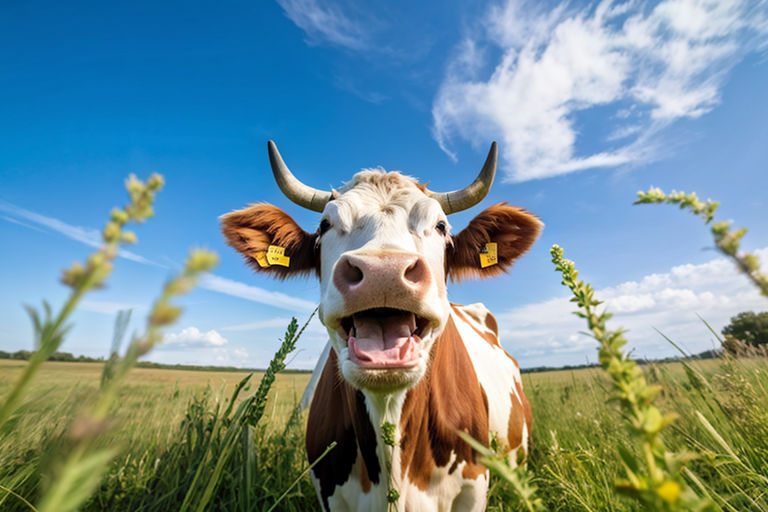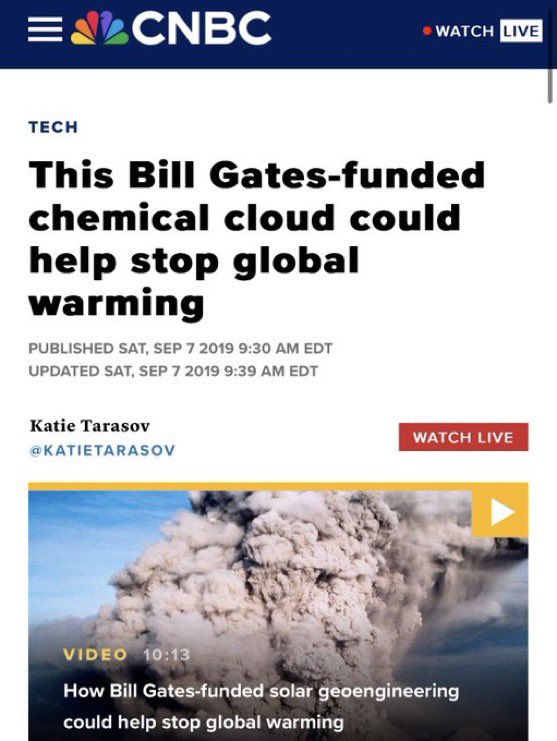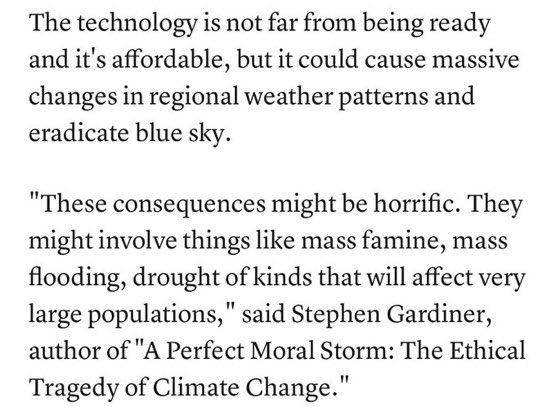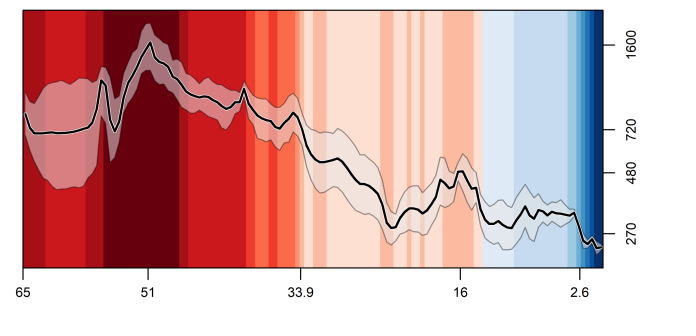
In a world increasingly focused on combating climate change, the strategies proposed by influential figures like Bill Gates often attract widespread attention and controversy. However, some of these proposals, such as high-altitude solar geoengineering and the vilification of naturally occurring carbon dioxide, warrant a closer examination due to their potentially dire consequences and questionable scientific foundations.
CNBC reported Gates’ support for this controversial method, which seeks to mimic the effects of a giant volcanic eruption. However, the potential risks associated with such an experiment are staggering, and instead of reducing the amount of carbon dioxide in the air, it will only make it worse.


Bill Gates has also been a vocal advocate for high-altitude experiments in solar geoengineering, a radical climate change solution that involves spraying millions of tons of particles into the atmosphere to form a massive chemical cloud aimed at cooling the Earth’s surface.
“Bill Gates is backing the first high-altitude experiment of one radical climate change solution. Creating a massive chemical cloud that can cool the earth. It’s called solar geoengineering and it’s highly controversial.”
— James Melville 🚜 (@JamesMelville) July 3, 2024
~ CNBC pic.twitter.com/8WDyvXgpHg
Stephen Gardiner, author of “A Perfect Moral Storm: The Ethical Tragedy of Climate Change,” warns that the consequences of solar geoengineering could be catastrophic, potentially leading to mass famine, flooding, and droughts that would affect large populations globally.
Critics argue that this method is not only risky but also diverts attention from more sustainable and less hazardous solutions. For instance, reforestation and afforestation efforts have proven to be effective in sequestering carbon dioxide, a naturally occurring gas essential for life on Earth.
“Bill Gates is backing the first high-altitude experiment of one radical climate change solution. Creating a massive chemical cloud that can cool the earth. It’s called solar geoengineering and it’s highly controversial.”
CNBC
“I don’t plant trees”
“I don’t plant trees”.
— James Melville 🚜 (@JamesMelville) June 30, 2024
~ Bill Gates
He adds that it’s “complete nonsense” to think that tree planting could solve climate change and “are we the science people or are we the idiots?”
Many would beg to differ on his opinions here. pic.twitter.com/NqDxG0Xb5T
“I don’t plant trees,” Gates said. He adds that it’s “complete nonsense” to think that tree planting could solve climate change and “are we the science people or are we the idiots?” Despite Gates’ dismissal of tree planting as “complete nonsense,” forests continue to play a crucial role in absorbing carbon dioxide through photosynthesis, thus helping to mitigate climate change. Encouraging companies to invest in reforestation projects and offering financial incentives could provide a safer and more reliable approach to reducing carbon emissions.
Stopping cow farts
“Cows burp and fart methane to an extreme degree. You can either fix cows to stop them doing that or you can make beef without the cow.”
— James Melville 🚜 (@JamesMelville) July 2, 2024
~ Bill Gates
He completely ignores the carbon cycle of methane which converts into CO2 & also photosynthesis and carbon sequestration. pic.twitter.com/dl8jRtP8LG
“Cows burp and fart methane to an extreme degree. You can either fix cows to stop them doing that or you can make beef without the cow,” Gates said.
“Cows have a digestion system that emits methane. We need to change cows and work towards artificial meat.”
— James Melville 🚜 (@JamesMelville) June 30, 2024
~ Bill Gates
He fails to point out that methane from cows breaks down into CO2 & water after 10 years. Grass absorbs the CO2 by photosynthesis & the cycle repeats itself. pic.twitter.com/0ZdUZidK3J
“Cows have a digestion system that emits methane. We need to change cows and work towards artificial meat,” he adds.
However, what is missing from mainstream news articles is information on how artificial meat is actually made. To start the process, stem cells must be extracted from a living animal, typically through a biopsy. As cultured meat is a relatively new field, regulations are still evolving and there are currently no laws in place to ensure that animals survive the procedure or do not suffer from the effects of a harmful biopsy. Cultured meat is not vegan as currently it is sourced from stem cells of living animals.
Moreover, Gates’ focus on methane emissions from cows and the promotion of artificial meat alternatives overlooks the natural carbon cycle. Methane, while more potent than carbon dioxide in the short term, breaks down into CO2 and water after approximately 10-12 years. This CO2 is then absorbed by grass through photosynthesis, perpetuating a natural and sustainable cycle. Cow manure also enhances soil quality, further benefiting the environment. The demonization of methane emissions from livestock ignores these critical aspects of the carbon cycle and the broader ecological benefits of traditional farming practices.
He’s right. Cows are environmentally sustainable. Methane from cows is part of the natural carbon cycle that after 10-12 years breaks down into natural CO2 and water. Grass absorbs the CO2 by photosynthesis and the cycle repeatedly continues. Cow manure also improves the soil. pic.twitter.com/1iWNtNI4VG
— James Melville 🚜 (@JamesMelville) June 22, 2024
Carbon = carbon dioxide. Plant food. Your outbreath. The thing that makes life on earth habitable.
The underlying assumption that carbon dioxide is an unequivocal bad actor in climate change also merits scrutiny. Carbon dioxide is essential for plant life and, by extension, all life on Earth. It is the gas that plants use in photosynthesis to produce oxygen and organic matter. Even in efforts to terraform Mars, scientists recognize the necessity of introducing carbon dioxide to create a habitable environment. According to a 2023 study by the University of California Santa Cruz, Earth has experienced higher CO2 levels and warmer temperature in the past, as seen in the graph below:

The vilification of CO2, particularly human-generated CO2, fails to acknowledge its vital role in maintaining life and the natural processes that regulate its levels in the atmosphere.
While innovative approaches to climate change are necessary, they must be grounded in a comprehensive understanding of environmental science and potential risks. High-altitude solar geoengineering poses significant threats to global ecosystems and human populations, and the dismissal of natural processes like the carbon cycle undermines the importance of sustainable solutions. Encouraging reforestation and recognizing the ecological benefits of traditional farming practices offer a more balanced and less hazardous path forward. It is imperative to approach climate change with strategies that enhance, rather than disrupt, the natural systems that sustain life on Earth.
RELATED: SHOCKING: UN Report Discusses Plans to Block Out the Sun







